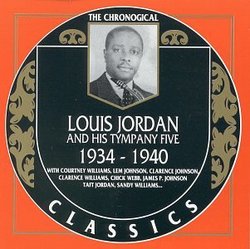| All Artists: Louis Jordan Title: Louis Jordan 1934 1940 Members Wishing: 2 Total Copies: 0 Label: Allegro Corporation Release Date: 7/29/1997 Genres: Blues, Jazz, R&B Styles: Regional Blues, East Coast Blues, Jump Blues, Swing Jazz, Vocal Jazz, Classic R&B Number of Discs: 1 SwapaCD Credits: 1 UPC: 750582467424 |
Search - Louis Jordan :: Louis Jordan 1934 1940
 | Louis Jordan Louis Jordan 1934 1940 Genres: Blues, Jazz, R&B
|
Larger Image |
CD Details |
CD ReviewsLouie - The King of Jump Blues Kirill | Russia | 03/04/2001 (5 out of 5 stars) "Well, Louis Jordan is one of the true pioneers in music. This nice packed cd tell you his story through the early 30's - the times when he raised. Here you can find his first record for long associated Decca - "Honey at the Bee Ball" which was recorded in 1938. At that time his band was called Elks Rendezvous. You can also check out the first songs by his Tympany Five (which were formed in 1939). If you like blues and swing you'll love Louis Jordan. He's a truly funny musician, but also know how to sing the blues ;) As all this was recorded long time ago some records were not hi-fi quality, but if you need to became familiar with a true spirit of joy - listen to this nice Album by a great Musician." Where the clowing jive began Andre M. | Mt. Pleasant, SC United States | 11/10/2005 (4 out of 5 stars) "These are the earliest recordings of Louis Jordan (aside from an extremely rare cut with Charlie Gaines and fellow jazz comedy King Louis Armstrong in 1932) that shows you the beginning of the career of the super-lunatic madman supreme of jazz and R&B.
"I Can't Dance Gor Ants in My Pants" (1934) is no realtion to the James Brown tune of forty years later (although JB cites LJ as an influence), but it is a funny precursor to rap and sets the blueprint for LJ's funny tales mixed with his sax appeal and jazz boogie beat. "Rusty Hinge," a 1937 lead vocal when LJ was with the Chick Webb Orchestra, was probably the first recording of LJ showing his chops as a serious singer. The set is marred with terrible tunes by a lead "vocalist" named Rodney Sturgis who has since faded to deserved obscurity. Plus, there are a few false starts with Jordan's attemtps at jazz comedy (such as "Barnacle Bill the Sailor" and "Three Littel Squirrels") that shows that he had some ways to go in forming his distinct style. "Keep a Knockin" (1941) is the original version of the tune made famous by Jordan fan Little Richard some 14 years later. "Swinging in the Coconut Trees" is a really rocking and funny instrumental and "June teenth Jaamboree" is a rare commic look at the Black celebration of the freeing of the slaves that was only celebrated in texas at the time. If you love Louis Jordan, be warned that you have to wade through some clunckers in the midst of the good stuff, but at least you'll see where it all began." |

 Track Listings (25) - Disc #1
Track Listings (25) - Disc #1